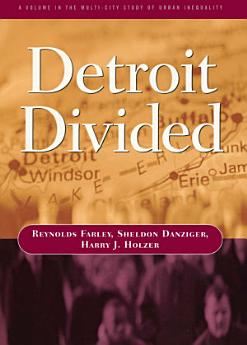Detroit Divided
may 2000 · Russell Sage Foundation
Libro electrónico
328
Páginas
reportLas calificaciones y opiniones no están verificadas. Más información
Acerca de este libro electrónico
Unskilled workers once flocked to Detroit, attracted by manufacturing jobs paying union wages, but the passing of Detroit's manufacturing heyday has left many of those workers stranded. Manufacturing continues to employ high-skilled workers, and new work can be found in suburban service jobs, but the urban plants that used to employ legions of unskilled men are a thing of the past. The authors explain why white auto workers adjusted to these new conditions more easily than blacks. Taking advantage of better access to education and suburban home loans, white men migrated into skilled jobs on the city's outskirts, while blacks faced the twin barriers of higher skill demands and hostile suburban neighborhoods. Some blacks have prospered despite this racial divide: a black elite has emerged, and the shift in the city toward municipal and service jobs has allowed black women to approach parity of earnings with white women. But Detroit remains polarized racially, economically, and geographically to a degree seen in few other American cities. A Volume in the Multi-City Study of Urban Inequality
Acerca del autor
REYNOLDS FARLEY is Otis Dudley Duncan Collegiate Professor of Sociology, University of Michigan, and research scientist at the Population Studies Center of the Institute for Social Research. SHELDON DANZIGER is Henry J. Meyer Collegiate Professor of Social Work and Public Policy and director of the Center on Poverty Risk and Mental Health at the University of Michigan. HARRY J. HOLZER is professor of economics at Michigan State University.
Califica este libro electrónico
Cuéntanos lo que piensas.
Información de lectura
Smartphones y tablets
Instala la app de Google Play Libros para Android y iPad/iPhone. Como se sincroniza de manera automática con tu cuenta, te permite leer en línea o sin conexión en cualquier lugar.
Laptops y computadoras
Para escuchar audiolibros adquiridos en Google Play, usa el navegador web de tu computadora.
Lectores electrónicos y otros dispositivos
Para leer en dispositivos de tinta electrónica, como los lectores de libros electrónicos Kobo, deberás descargar un archivo y transferirlo a tu dispositivo. Sigue las instrucciones detalladas que aparecen en el Centro de ayuda para transferir los archivos a lectores de libros electrónicos compatibles.





